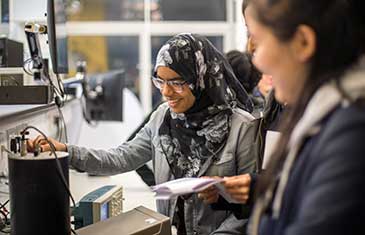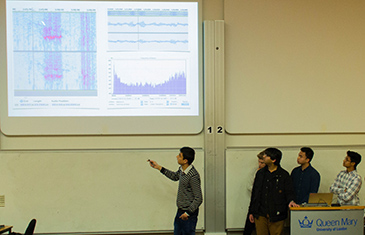So You’re Looking to Run a Research in Schools Project?

Written by Martin Archer, Outreach Officer at the School of Physics and Astronomy
I remember science at school was never really like the science I do now, you didn’t feel like you were anywhere near the cutting edge or indeed what that cutting edge even was. But it doesn’t have to be that way, Research in Schools programmes have started to emerge in the UK as a way for school students to experience science in the way that researchers do and work on projects tied to current scientific research.
I’ve piloted such a programme at Queen Mary University of London’s School of Physics and Astronomy over the past two years, aiming to raise awareness of the latest research questions, enable students to understand how research works and helping students conduct their own long-term research projects in collaboration with the university.
So far we’ve run two projects: one based on the cosmic rays which serve as the background to our neutrino experiments deep underground; and the other surrounding sound waves in space that can affect our satellite technology. The programme has grown slowly but surely from one school, to five and now 24 and through this process I’ve learned a lot. For that reason, I’ve written a report detailing the highlights, challenges, what did work and what didn’t along with a set of conclusions and recommendations for others thinking of setting up similar projects.
I’m not going to lie, Research in Schools projects require a significant amount of time and effort by everyone involved. Thankfully, we’ve found that so far this effort is worthwhile. The students involved across the board gained significantly greater understanding of scientific topics and practises relevant to the projects they were involved with. Moreover, the sorts of experiences the students had undertaking these 6-month long projects was overwhelmingly positive with “interesting”, “challenging” and “inspiring” being the top three most-quoted words used. Finally, they also recognised that they’d developed a large range of skills simply by taking part in the projects. But not only the students benefited, their teachers also felt reconnected with their subject, the projects challenged them and they learned a lot through taking part. These can only be good things.

The important thing that I’ve found is that for these projects to be successful they need to be well structured and supported by the university throughout. The structure we’ve opted for starts with students working on a prescribed initial activity so that they can build confidence before being let loose into the open-ended world of research. This requires a good set of written resources too, for both students and teachers, along with all the hardware and software they might need. Once students are underway, the skills and expertise of current researchers is invaluable in steering their work on track so that they can produce results.
Speaking of results, we get our students to present these at their own scientific conference attended by fellow students, teachers, parents and researchers. It’s a great occasion and I’m very much looking forward to seeing what our schools researchers have come up with later this year.
Physics Research in Schools was a finalist project in the QMUL Engagement and Enterprise Awards 2017, recognised in the 'Inspire' Category. For the full description and findings behind the Research in Schools programme you can read the report here.
Martin has recently launched the Space Sound Effects (SSFX) Short Film competition, an online short film competition inviting filmmakers to submit entries using real-life sound recorded from space. The competition closes on Monday 03 July 2017.
Written by Martin Archer
Outreach Officer
School of Physics and Astronomy
http://www.martinarcher.co.uk/
@martinarcher